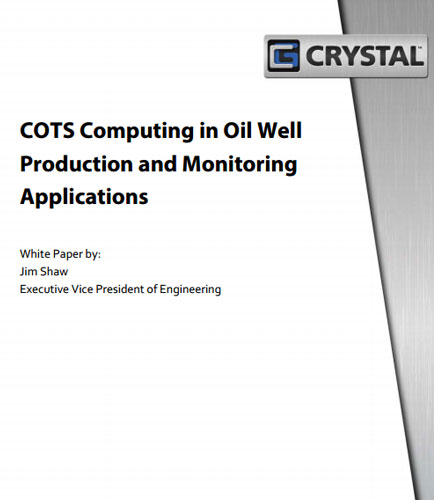
PROCESSING. PLEASE WAIT...


White Paper: Crystal Group
The recent trend of need for server class computing on a well site has provided challenges for companies that need to carefully monitor production for the purposes of regulatory requirements in addition to production optimization.
The oil field is a relatively inhospitable place for computers, power supplies, and network switches. Selecting the right components and protecting them from damage is a key factor in a long and uneventful life.
This whitepaper addresses high-end computer integration associated with well head and down-hole monitoring and provides suggestions for successful system integration for reliable jobsite operations.
Key takeaways from this whitepaper:
A starting point is the transit case enclosure selection
Computing challenge for cots computers in oil production
Clean power is a key issue on-site
Characteristics of a true On-Line UPS
By: Crystal Group
All of the power supplies tested passed the thermal, stress test, and low/high voltage operation criteria at 440 Hz. However, there is one very important parameter that must be considered in deeming a power supply appropriate for operation in a 400 Hz environment. This parameter is known as power factor, commonly abbreviated as PF. The higher the PF (desired), the lower the reactance and the more current is in phase with the voltage. The lower the PF (undesired), the higher the reactance and the more out of phase is the current with respect to the voltage. The purposes of this whitepaper are: to provide confidence in claiming compliant operation outside the stated vendor specifications, namely at 400 Hz, suitable for use with airborne power buses to provide compliance with margin and eliminate borderline passing scenarios to provide insights on the supplies that are 400 Hz compatible
By: Qualys [NASDAQ: QLYS]
Today, the cloud-based security services are expected to be a “new area of growth.” The adoption of cloud solutions is driven by the need to innovate, simplify and cut costs. Avoiding the cost and the complexity of traditional software is one of the reasons why cloud services has become a mainstream delivery method for security solutions. This whitepaper explains how you can use cloud-based security to protect your network and ensure compliance without breaking the bank. Key takeaways from this whitepaper: Why smaller organizations are vulnerable Common approaches to security are too expensive Cloud-based security is more affordable & effective Seizing other benefits of cloud-based security Continuous security and compliance solutions


 2024 All Rights Reserved | by: www.ciowhitepapersreview.com
2024 All Rights Reserved | by: www.ciowhitepapersreview.com